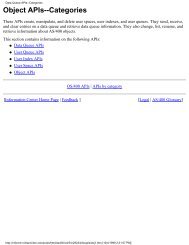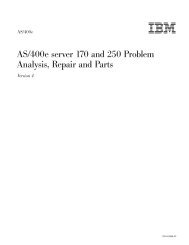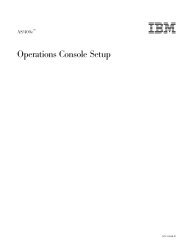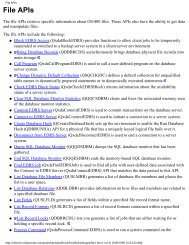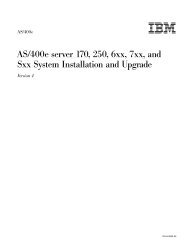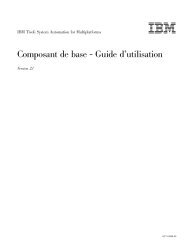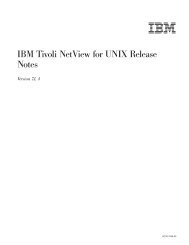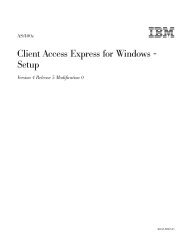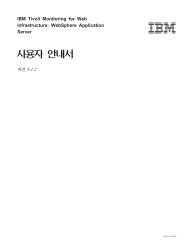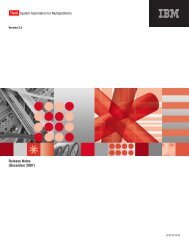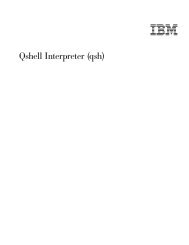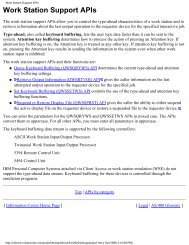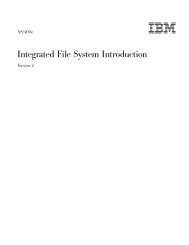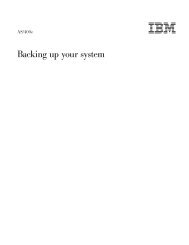You also want an ePaper? Increase the reach of your titles
YUMPU automatically turns print PDFs into web optimized ePapers that Google loves.
found' condition */<br />
CPYF FROMFILE(NOLIB/NOFILE) TOFILE(D504/KEY) +<br />
FROMMBR(NOMBR) TOMBR(MBR1) MBROPT(*ADD)<br />
MONMSG MSGID(CPF2817) CMPDTA(CPF2802) +<br />
EXEC(SNDPGMMSG TOPGMQ(*EXT) +<br />
MSG('<strong>File</strong> NOFILE in NOLIB not found'))<br />
ENDPGM<br />
Any error other than from-file not found, including any other error reported with<br />
a CPF2817 escape message, causes a check in this program because the MONMSG<br />
command applies only to the CPF2817 escape when it has the compare data from<br />
message CPF2802.<br />
If you are running the CPYFRMQRYF command, it does not normally close the<br />
open query file after completing the copy. However, if you are running the<br />
CPYFRMQRYF command from a command entry line, any error messages<br />
occurring after the OPNQRYF command is successfully run will close the file<br />
unless you specified TYPE(*PERM) on the OPNQRYF command. The system<br />
automatically runs a Reclaim Resources (RCLRSC) command if an error message<br />
occurs. If the OPNQRYF command specified TYPE(*PERM), the system does not<br />
automatically close the file.<br />
The following messages can be sent as diagnostic messages, followed immediately<br />
by a CPF2817 escape message. Some of these messages can also be sent as other<br />
message types (such as an informational or escape message). When the message is<br />
sent as a diagnostic message type, the message identifier appears in the<br />
replacement text of the CPF2817 escape message. You can monitor the condition by<br />
using the CMPDTA parameter on the MONMSG command:<br />
CPD2807 CPD2808<br />
CPD2809 CPD2810<br />
CPD2811 CPD2812<br />
CPD2825 CPD2968<br />
CPD2969 CPD2970<br />
CPD2971 CPD2972<br />
CPD2973 CPD2974<br />
CPD2975 CPD2976<br />
CPD2979 CPD2980<br />
CPD2981 CPF2801<br />
CPF2802 CPF2803<br />
CPF2804 CPF2805<br />
CPF2806 CPF2807<br />
CPF2808 CPF2810<br />
CPF2811 CPF2812<br />
CPF2813 CPF2814<br />
CPF2816 CPF2819<br />
CPF2820 CPF2821<br />
CPF2822 CPF2823<br />
CPF2825 CPF2826<br />
CPF2827 CPF2831<br />
CPF2832 CPF2833<br />
CPF2834 CPF2836<br />
CPF2837 CPF2839<br />
CPF2840 CPF2841<br />
CPF2842 CPF2843<br />
CPF2844 CPF2847<br />
CPF2848 CPF2849<br />
CPF2851 CPF2853<br />
CPF2854 CPF2855<br />
CPF2856 CPF2857<br />
CPF2860 CPF2861<br />
CPF2862 CPF2863<br />
CPF2864 CPF2865<br />
CPF2868 CPF2869<br />
CPF2870 CPF2871<br />
Monitoring for zero records in the from-file<br />
CPF2872 CPF2873<br />
CPF2874 CPF2877<br />
CPF2878 CPF2879<br />
CPF2881 CPF2883<br />
CPF2884 CPF2890<br />
CPF2891 CPF2893<br />
CPF2960 CPF2962<br />
CPF2963 CPF2965<br />
CPF2969 CPF9807<br />
CPF9808 CPF9820<br />
CPF9830<br />
There are some special considerations for copy when the from-file is a physical or<br />
logical file and one or more members to be copied are empty. A member is<br />
considered empty in the following cases:<br />
v You specified COMPRESS(*NO) on the CPYF command, and the from-file<br />
member contains no records.<br />
v You specified COMPRESS(*YES) for a COPY command, and the from-file<br />
members contain no undeleted records.<br />
Members copied involving record selection (CPYFRMQRYF command or the<br />
INCCHAR and INCREL parameters of the CPYF command) that produce no<br />
records are not considered empty.<br />
When the to-file is a printer file (including *PRINT), or when the to-file is a<br />
physical file and you specified MBROPT(*ADD) or MBROPT(*UPDADD), empty<br />
Chapter 4. Copying files 79



